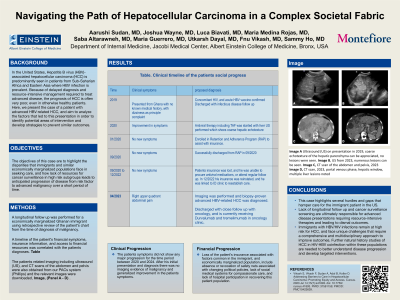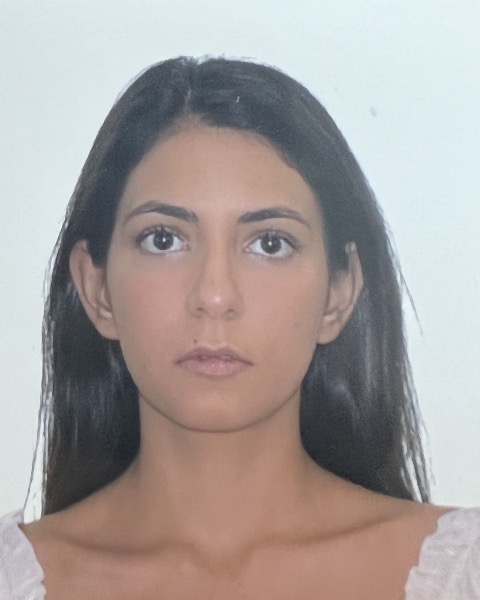Tuesday Poster Session
Category: Liver
P4012 - Navigating the Path of Hepatocellular Carcinoma in a Complex Societal Fabric
Tuesday, October 24, 2023
10:30 AM - 4:00 PM PT
Location: Exhibit Hall

Has Audio

Aarushi Sudan, MD
Jacobi Medical Center
New York, New York
Presenting Author(s)
Aarushi Sudan, MD1, Joshua Wynne, MD2, Luca Biavati, MD1, Maria Medina Rojas, MD1, Saba Altarawneh, MD3, Maria Gabriela Rubianes Guerrero, MD1, Utkarsh Dayal, MBBS4, Fnu Vikash, MD5, Sammy Ho, MD2
1Jacobi Medical Center, New York, NY; 2Montefiore Medical Center, New York, NY; 3Marshall University, Huntington, WV; 4University College of Medical Sciences, Delhi, Delhi, India; 5Jacobi Medical Center, Albert Einstein College of Medicine, Bronx, NY
Introduction: In the United States, Hepatitis B virus (HBV)-associated hepatocellular carcinoma (HCC) is predominantly seen in patients from Sub-Saharian Africa and Eastern Asia where HBV infection is prevalent. Because of delayed diagnosis and resource-intensive management required to treat advanced disease, the prognosis of HCC is often very poor, even in otherwise healthy patients. Here, we present the case of a patient with advanced HBV-related HCC and aim to analyze the factors that led to this presentation in order to identify potential areas of intervention and develop strategies to prevent similar outcomes.
Case Description/Methods: In 2019, a 52 year-old male from Ghana without any known medical history, initially presented to our hospital with complaint of dizziness. At the time, he was diagnosed with concomitant HIV and acute HBV infection, and discharged with infectious disease (ID) clinic follow-up. Antiviral therapy including TAF was started and Liver US was performed which showed coarse heterogeneous hepatic echotexture. He was enrolled in a Retention and Adherence Program to assist with insurance, medication procurement, and appointment scheduling. After being successfully discharged from RAP in September 2020, the patient’s insurance coverage was lost for seven consecutive months during which he was unable to procure antiviral medications or attend regular follow-up. With the involvement of social and financial services, in late December 2022, the patient’s insurance was re-instated and he was linked to ID clinic to re-establish care. However, in April 2023, he presented to the ER for severe right upper quadrant abdominal pain. Further imaging was performed and biopsy-proven advanced HBV-related HCC was diagnosed. He was discharged with close follow-up with oncology and is currently receiving Durvalumab and tremelimumab in oncology clinic.
Discussion: Overall this case highlights several hurdles and gaps that hamper care for immigrant patients in the US. Lack of longitudinal follow-up and cancer surveillance screening is ultimately responsible for advanced disease presentations requiring resource-intensive therapies and leading to dismal outcomes. Immigrants with HBV/HIV infections remain at high risk for HCC and face unique challenges that require a comprehensive and multidisciplinary approach to improve outcomes. Further natural history studies of HCC in HIV-HBV coinfection within these populations are needed to better understand disease progression and develop targeted interventions.

Disclosures:
Aarushi Sudan, MD1, Joshua Wynne, MD2, Luca Biavati, MD1, Maria Medina Rojas, MD1, Saba Altarawneh, MD3, Maria Gabriela Rubianes Guerrero, MD1, Utkarsh Dayal, MBBS4, Fnu Vikash, MD5, Sammy Ho, MD2. P4012 - Navigating the Path of Hepatocellular Carcinoma in a Complex Societal Fabric, ACG 2023 Annual Scientific Meeting Abstracts. Vancouver, BC, Canada: American College of Gastroenterology.
1Jacobi Medical Center, New York, NY; 2Montefiore Medical Center, New York, NY; 3Marshall University, Huntington, WV; 4University College of Medical Sciences, Delhi, Delhi, India; 5Jacobi Medical Center, Albert Einstein College of Medicine, Bronx, NY
Introduction: In the United States, Hepatitis B virus (HBV)-associated hepatocellular carcinoma (HCC) is predominantly seen in patients from Sub-Saharian Africa and Eastern Asia where HBV infection is prevalent. Because of delayed diagnosis and resource-intensive management required to treat advanced disease, the prognosis of HCC is often very poor, even in otherwise healthy patients. Here, we present the case of a patient with advanced HBV-related HCC and aim to analyze the factors that led to this presentation in order to identify potential areas of intervention and develop strategies to prevent similar outcomes.
Case Description/Methods: In 2019, a 52 year-old male from Ghana without any known medical history, initially presented to our hospital with complaint of dizziness. At the time, he was diagnosed with concomitant HIV and acute HBV infection, and discharged with infectious disease (ID) clinic follow-up. Antiviral therapy including TAF was started and Liver US was performed which showed coarse heterogeneous hepatic echotexture. He was enrolled in a Retention and Adherence Program to assist with insurance, medication procurement, and appointment scheduling. After being successfully discharged from RAP in September 2020, the patient’s insurance coverage was lost for seven consecutive months during which he was unable to procure antiviral medications or attend regular follow-up. With the involvement of social and financial services, in late December 2022, the patient’s insurance was re-instated and he was linked to ID clinic to re-establish care. However, in April 2023, he presented to the ER for severe right upper quadrant abdominal pain. Further imaging was performed and biopsy-proven advanced HBV-related HCC was diagnosed. He was discharged with close follow-up with oncology and is currently receiving Durvalumab and tremelimumab in oncology clinic.
Discussion: Overall this case highlights several hurdles and gaps that hamper care for immigrant patients in the US. Lack of longitudinal follow-up and cancer surveillance screening is ultimately responsible for advanced disease presentations requiring resource-intensive therapies and leading to dismal outcomes. Immigrants with HBV/HIV infections remain at high risk for HCC and face unique challenges that require a comprehensive and multidisciplinary approach to improve outcomes. Further natural history studies of HCC in HIV-HBV coinfection within these populations are needed to better understand disease progression and develop targeted interventions.

Figure: Image A shows an ultrasound on the initial presentation in 2019, coarse echotexture of the hepatic parenchyma can be appreciated, no lesions were seen. Image B is the patient's ultrasound from a subsequent encounter in 2023. Numerous lesions can be seen. The patient did not undergo any imaging in between. Images C and D are cross-sections from a CT scan performed during his encounter in 2023. Image C: Innumerable liver lesions can be seen (Portal venous phase). Image D: multiple liver lesions with ascites (portal venous phase, hepatic window). An image-guided paracentesis was performed revealing 700 mL of old blood. Imaging findings along with ascitic fluid findings suggested that the patient had likely sustained a rupture of a subcapsular liver mass, resulting in intraperitoneal bleeding.
Disclosures:
Aarushi Sudan indicated no relevant financial relationships.
Joshua Wynne indicated no relevant financial relationships.
Luca Biavati indicated no relevant financial relationships.
Maria Medina Rojas indicated no relevant financial relationships.
Saba Altarawneh indicated no relevant financial relationships.
Maria Gabriela Rubianes Guerrero indicated no relevant financial relationships.
Utkarsh Dayal indicated no relevant financial relationships.
Fnu Vikash indicated no relevant financial relationships.
Sammy Ho indicated no relevant financial relationships.
Aarushi Sudan, MD1, Joshua Wynne, MD2, Luca Biavati, MD1, Maria Medina Rojas, MD1, Saba Altarawneh, MD3, Maria Gabriela Rubianes Guerrero, MD1, Utkarsh Dayal, MBBS4, Fnu Vikash, MD5, Sammy Ho, MD2. P4012 - Navigating the Path of Hepatocellular Carcinoma in a Complex Societal Fabric, ACG 2023 Annual Scientific Meeting Abstracts. Vancouver, BC, Canada: American College of Gastroenterology.
